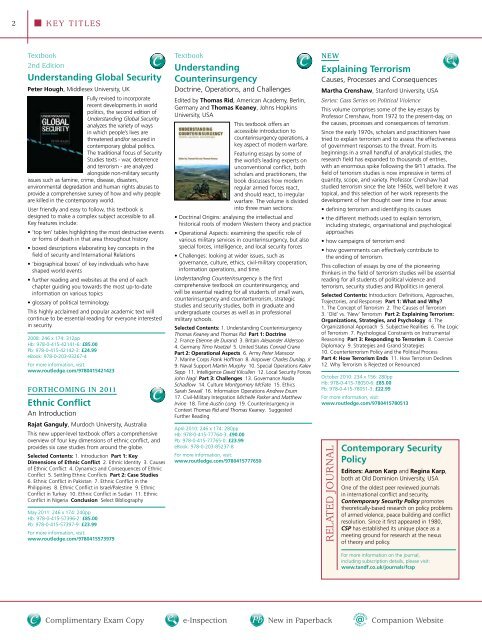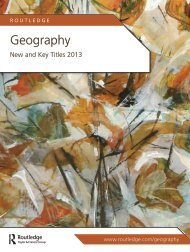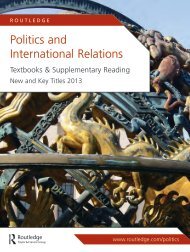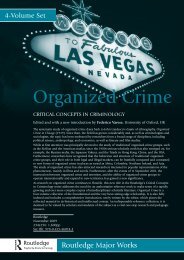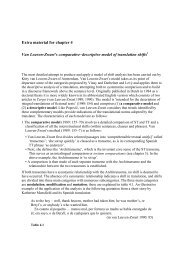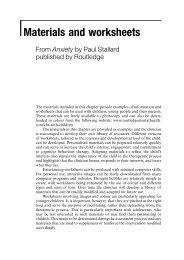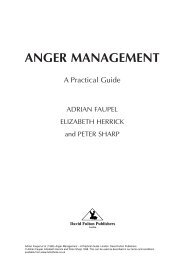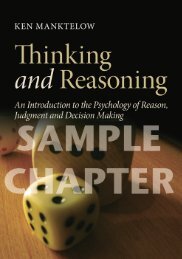Easily na - Routledge
Easily na - Routledge
Easily na - Routledge
Create successful ePaper yourself
Turn your PDF publications into a flip-book with our unique Google optimized e-Paper software.
2<br />
Key TiTles<br />
Textbook<br />
2nd Edition<br />
Understanding Global Security<br />
Peter Hough, Middlesex University, UK<br />
Fully revised to incorporate<br />
recent developments in world<br />
politics, the second edition of<br />
Understanding Global Security<br />
a<strong>na</strong>lyzes the variety of ways<br />
in which people’s lives are<br />
threatened and/or secured in<br />
contemporary global politics.<br />
The traditio<strong>na</strong>l focus of Security<br />
Studies texts - war, deterrence<br />
and terrorism - are a<strong>na</strong>lyzed<br />
alongside non-military security<br />
issues such as famine, crime, disease, disasters,<br />
environmental degredation and human rights abuses to<br />
provide a comprehensive survey of how and why people<br />
are killed in the contemporary world.<br />
User friendly and easy to follow, this textbook is<br />
designed to make a complex subject accessible to all.<br />
Key features include:<br />
• ‘top ten’ tables highlighting the most destructive events<br />
or forms of death in that area throughout history<br />
• boxed descriptions elaborating key concepts in the<br />
field of security and Inter<strong>na</strong>tio<strong>na</strong>l Relations<br />
• ‘biographical boxes’ of key individuals who have<br />
shaped world events<br />
• further reading and websites at the end of each<br />
chapter guiding you towards the most up-to-date<br />
information on various topics<br />
• glossary of political terminology.<br />
This highly acclaimed and popular academic text will<br />
continue to be essential reading for everyone interested<br />
in security.<br />
2008: 246 x 174: 312pp<br />
Hb: 978-0-415-42141-6: £85.00<br />
Pb: 978-0-415-42142-3: £24.99<br />
eBook: 978-0-203-93267-4<br />
For more information, visit:<br />
www.routledge.com/9780415421423<br />
Forthcoming in 2011<br />
Ethnic Conflict<br />
An Introduction<br />
Rajat Ganguly, Murdoch University, Australia<br />
This new upper-level textbook offers a comprehensive<br />
overview of four key dimensions of ethnic conflict, and<br />
provides six case studies from around the globe.<br />
Selected Contents: 1. Introduction Part 1: Key<br />
Dimensions of Ethnic Conflict 2. Ethnic Identity 3. Causes<br />
of Ethnic Conflict 4. Dy<strong>na</strong>mics and Consequences of Ethnic<br />
Conflict 5. Settling Ethnic Conflicts Part 2: Case Studies<br />
6. Ethnic Conflict in Pakistan 7. Ethnic Conflict in the<br />
Philippines 8. Ethnic Conflict in Israel/Palestine 9. Ethnic<br />
Conflict in Turkey 10. Ethnic Conflict in Sudan 11. Ethnic<br />
Conflict in Nigeria Conclusion Select Bibliography<br />
May 2011: 246 x 174: 240pp<br />
Hb: 978-0-415-57396-2: £85.00<br />
Pb: 978-0-415-57397-9: £23.99<br />
For more information, visit:<br />
www.routledge.com/9780415573979<br />
Textbook<br />
Understanding<br />
Counterinsurgency<br />
Doctrine, Operations, and Challenges<br />
Edited by Thomas Rid, American Academy, Berlin,<br />
Germany and Thomas Keaney, Johns Hopkins<br />
University, USA<br />
This textbook offers an<br />
accessible introduction to<br />
counterinsurgency operations, a<br />
key aspect of modern warfare.<br />
Featuring essays by some of<br />
the world’s leading experts on<br />
unconventio<strong>na</strong>l conflict, both<br />
scholars and practitioners, the<br />
book discusses how modern<br />
regular armed forces react,<br />
and should react, to irregular<br />
warfare. The volume is divided<br />
into three main sections:<br />
• Doctri<strong>na</strong>l Origins: a<strong>na</strong>lysing the intellectual and<br />
historical roots of modern Western theory and practice<br />
• Operatio<strong>na</strong>l Aspects: examining the specific role of<br />
various military services in counterinsurgency, but also<br />
special forces, intelligence, and local security forces<br />
• Challenges: looking at wider issues, such as<br />
gover<strong>na</strong>nce, culture, ethics, civil-military cooperation,<br />
information operations, and time.<br />
Understanding Counterinsurgency is the first<br />
comprehensive textbook on counterinsurgency, and<br />
will be essential reading for all students of small wars,<br />
counterinsurgency and counterterrorism, strategic<br />
studies and security studies, both in graduate and<br />
undergraduate courses as well as in professio<strong>na</strong>l<br />
military schools.<br />
Selected Contents: 1. Understanding Counterinsurgency<br />
Thomas Keaney and Thomas Rid Part 1: Doctrine<br />
2. France Etienne de Durand 3. Britain Alexander Alderson<br />
4. Germany Timo Noetzel 5. United States Conrad Crane<br />
Part 2: Operatio<strong>na</strong>l Aspects 6. Army Peter Mansoor<br />
7. Marine Corps Frank Hoffman 8. Airpower Charles Dunlap, Jr<br />
9. Naval Support Martin Murphy 10. Special Operations Kalev<br />
Sepp 11. Intelligence David Kilcullen 12. Local Security Forces<br />
John Nagl Part 3: Challenges 13. Gover<strong>na</strong>nce Nadia<br />
Schadlow 14. Culture Montgomery McFate 15. Ethics<br />
Sarah Sewall 16. Information Operations Andrew Exum<br />
17. Civil-Military Integration Michelle Parker and Matthew<br />
Irvine 18. Time Austin Long 19. Counterinsurgency in<br />
Context Thomas Rid and Thomas Keaney. Suggested<br />
Further Reading<br />
April 2010: 246 x 174: 280pp<br />
Hb: 978-0-415-77764-3: £90.00<br />
Pb: 978-0-415-77765-0: £23.99<br />
eBook: 978-0-203-85237-8<br />
For more information, visit:<br />
www.routledge.com/9780415777650<br />
Complimentary exam Copy e-inspection New in Paperback Companion Website<br />
new<br />
Explaining Terrorism<br />
Causes, Processes and Consequences<br />
Martha Crenshaw, Stanford University, USA<br />
Series: Cass Series on Political Violence<br />
This volume comprises some of the key essays by<br />
Professor Crenshaw, from 1972 to the present-day, on<br />
the causes, processes and consequences of terrorism.<br />
Since the early 1970s, scholars and practitioners have<br />
tried to explain terrorism and to assess the effectiveness<br />
of government responses to the threat. From its<br />
beginnings in a small handful of a<strong>na</strong>lytical studies, the<br />
research field has expanded to thousands of entries,<br />
with an enormous spike following the 9/11 attacks. The<br />
field of terrorism studies is now impressive in terms of<br />
quantity, scope, and variety. Professor Crenshaw had<br />
studied terrorism since the late 1960s, well before it was<br />
topical, and this selection of her work represents the<br />
development of her thought over time in four areas:<br />
• defining terrorism and identifying its causes<br />
• the different methods used to explain terrorism,<br />
including strategic, organisatio<strong>na</strong>l and psychological<br />
approaches<br />
• how campaigns of terrorism end<br />
• how governments can effectively contribute to<br />
the ending of terrorism.<br />
This collection of essays by one of the pioneering<br />
thinkers in the field of terrorism studies will be essential<br />
reading for all students of political violence and<br />
terrorism, security studies and IR/politics in general.<br />
Selected Contents: Introduction: Definitions, Approaches,<br />
Trajectories, and Responses Part 1: What and Why?<br />
1. The Concept of Terrorism 2. The Causes of Terrorism<br />
3. ’Old’ vs. ’New’ Terrorism Part 2: Explaining Terrorism:<br />
Organizations, Strategies, and Psychology 4. The<br />
Organizatio<strong>na</strong>l Approach 5. Subjective Realities 6. The Logic<br />
of Terrorism 7. Psychological Constraints on Instrumental<br />
Reasoning Part 3: Responding to Terrorism 8. Coercive<br />
Diplomacy 9. Strategies and Grand Strategies<br />
10. Counterterrorism Policy and the Political Process<br />
Part 4: How Terrorism Ends 11. How Terrorism Declines<br />
12. Why Terrorism is Rejected or Renounced<br />
October 2010: 234 x 156: 280pp<br />
Hb: 978-0-415-78050-6: £85.00<br />
Pb: 978-0-415-78051-3: £22.99<br />
For more information, visit:<br />
www.routledge.com/9780415780513<br />
relaTed jourNal<br />
Contemporary Security<br />
Policy<br />
Editors: Aaron Karp and Regi<strong>na</strong> Karp,<br />
both at Old Dominion University, USA<br />
One of the oldest peer reviewed jour<strong>na</strong>ls<br />
in inter<strong>na</strong>tio<strong>na</strong>l conflict and security,<br />
Contemporary Security Policy promotes<br />
theoretically-based research on policy problems<br />
of armed violence, peace building and conflict<br />
resolution. Since it first appeared in 1980,<br />
CSP has established its unique place as a<br />
meeting ground for research at the nexus<br />
of theory and policy.<br />
For more information on the jour<strong>na</strong>l,<br />
including subscription details, please visit:<br />
www.tandf.co.uk/jour<strong>na</strong>ls/fcsp


